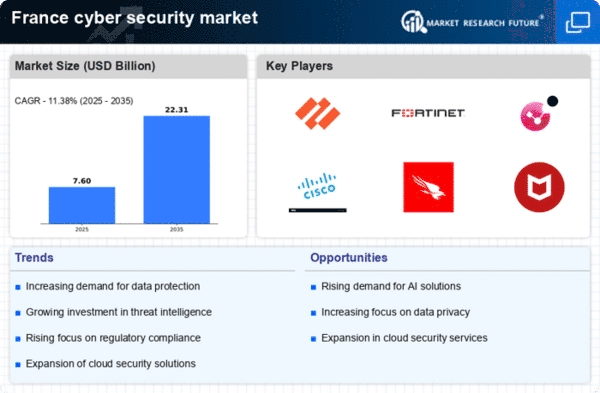Heightened Regulatory Environment
The regulatory landscape in France is evolving, with stricter compliance requirements influencing the cyber security market. The implementation of the General Data Protection Regulation (GDPR) has set a precedent for data protection laws, compelling organizations to prioritize cyber security. In 2025, it is anticipated that compliance-related expenditures will constitute around 25% of the total cyber security market investments in France. This regulatory pressure drives companies to invest in advanced security solutions to avoid hefty fines and reputational damage. As organizations navigate this complex regulatory environment, the demand for compliance-focused cyber security services is likely to increase, further stimulating growth in the cyber security market.
Increasing Cyber Threat Landscape
The cyber security market in France is experiencing heightened demand due to an increasingly complex threat landscape. Cyber attacks are becoming more sophisticated, with a notable rise in ransomware incidents and data breaches. In 2025, it is estimated that cybercrime will cost businesses globally over $10 trillion annually, with France being a significant contributor to this figure. As organizations face these escalating threats, investments in cyber security solutions are likely to surge. This trend indicates a growing recognition of the need for robust security measures, driving the cyber security market forward. Companies are compelled to adopt advanced technologies and strategies to safeguard their digital assets, thereby enhancing the overall resilience of the cyber security market in France.
Emergence of Cyber Security Startups
The cyber security market in France is witnessing a surge in the emergence of innovative startups focused on addressing specific security challenges. These startups are developing cutting-edge solutions that cater to the evolving needs of businesses. In 2025, it is estimated that venture capital investments in cyber security startups will exceed €1 billion, highlighting the attractiveness of this sector. This influx of new players fosters competition and drives innovation within the cyber security market. As these startups introduce novel technologies and approaches, established companies are likely to adapt and enhance their offerings. This dynamic environment not only stimulates growth but also enriches the overall landscape of the cyber security market in France.
Rising Awareness of Cyber Security Risks
There is a growing awareness among businesses and consumers in France regarding the risks associated with cyber threats. This heightened consciousness is prompting organizations to prioritize cyber security measures, thereby driving market growth. In 2025, surveys indicate that approximately 70% of French companies will consider cyber security a top priority in their strategic planning. This shift in mindset is likely to lead to increased investments in security technologies and services. As organizations recognize the potential financial and reputational repercussions of cyber incidents, the demand for effective cyber security solutions is expected to rise. This trend reflects a broader understanding of the importance of safeguarding digital assets, contributing to the expansion of the cyber security market.
Expansion of Digital Transformation Initiatives
The ongoing digital transformation across various sectors in France is a critical driver for the cyber security market. As businesses increasingly adopt cloud computing, IoT, and AI technologies, the attack surface expands, necessitating enhanced security measures. In 2025, it is projected that the cloud security segment will account for approximately 30% of the total cyber security market revenue in France. This shift towards digitalization not only creates new opportunities but also exposes organizations to potential vulnerabilities. Consequently, the demand for comprehensive cyber security solutions is likely to grow, as companies seek to protect their digital infrastructures. This trend underscores the importance of integrating security into the digital transformation strategy, thereby propelling the cyber security market in France.
















